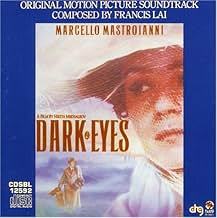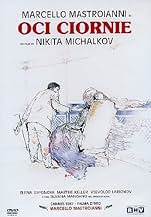NOTE IMDb
7,3/10
3,7 k
MA NOTE
Ajouter une intrigue dans votre langueAn Italian tells his story of love to a Russian. In a series of flashbacks, Romano Patroni leaves his wife to visit a spa where he falls in love with a Russian woman. He returns to Italy res... Tout lireAn Italian tells his story of love to a Russian. In a series of flashbacks, Romano Patroni leaves his wife to visit a spa where he falls in love with a Russian woman. He returns to Italy resolved to leave his wife and marry his love.An Italian tells his story of love to a Russian. In a series of flashbacks, Romano Patroni leaves his wife to visit a spa where he falls in love with a Russian woman. He returns to Italy resolved to leave his wife and marry his love.
- Réalisation
- Scénario
- Casting principal
- Nommé pour 1 Oscar
- 12 victoires et 22 nominations au total
Elena Safonova
- Anna Sergeyevna, Governor's Wife
- (as Elena Sofonova)
Innokentiy Smoktunovskiy
- Il Governarore di Sisoev
- (as Innochentij Smoktunovskj)
Yuriy Bogatyryov
- Il Maresciallo
- (as Jury Bogatiriov)
Dmitriy Zolotukhin
- Konstantin
- (as Dimitri Zolothuchin)
Jean-Pierre Bardos
- Ospite sdraiato
- (as J. Pierre Bardos)
Elguja Burduli
- Il cuoco della nave
- (as Elgugia Burduli)
Pierluigi Cervetti
- Il maestro di ginnastica
- (as P. Luigi Cervetti)
Avis à la une
Based (loosely) on Chekhov's story "The Lady With The Little Dog," Oci Ciornie (Dark Eyes) features some of the most sumptuous photography of recent years. Set in Yalta, a sultry Black Sea spa for stylish Russian idlers, Dark eyes features a memorable tragic-comic performance by Marcello Mastroianni as Romano, foolish, gallant, ultimately trivial, and a superbly innocent, deeply moving performance by Yelena Safonova as the woman whom he utterly, shamefully fails. Mikhalkov's script departs from the Chekhov story in ways that some Chiekhov-loving viewers might balk at. But Chekhov's ending is perhaps too subtle and introspective for cinematic realization, and Mikhalkov's alternative, seems justified, if only as a vehicle for Matroianni's extraordinary performance.
At first it seemed a terribly slow start. This was exacerbated by our mistaken notion that "Oci Ciornie" was just another title for "Urga" - we kept wondering when and how they would ever get to Mongolia in that boat!
However, once we'd determined the actual story line the dilatory beginning seemed somehow apropos. Did Mikhalkov really mean to show us the emptiness of adultery? Or is he just an astute observer of the human condition? The parallels to the 1960 B&W "Lady with the Dog" (Russian) were striking. Especially the watermelon scene. But "Dark Eyes" takes the story further and carries the theme to its logical conclusion. My daughters hated it - they prefer stories of fidelity. But I did think it was refreshing for a film to come nearer the truth for a change. Adultery is not that fulfilling.
However, once we'd determined the actual story line the dilatory beginning seemed somehow apropos. Did Mikhalkov really mean to show us the emptiness of adultery? Or is he just an astute observer of the human condition? The parallels to the 1960 B&W "Lady with the Dog" (Russian) were striking. Especially the watermelon scene. But "Dark Eyes" takes the story further and carries the theme to its logical conclusion. My daughters hated it - they prefer stories of fidelity. But I did think it was refreshing for a film to come nearer the truth for a change. Adultery is not that fulfilling.
This Russian-Italian co-production from 1987 finds two older men, one Italian, the other Russian, talking in the empty dining hall of a slow ocean liner. The Italian tells his story in flashback, as we see him fight with his rich wife, which sends him to a health spa to recuperate, where he meets a bored, young and beautiful Russian woman who is herself unhappily married. After many overtures toward a romance, the Russian wife flees back home, and the Italian follows her, ostensibly on business, but truly in hopes of sparking the romance further.
The film is gorgeously photographed, and much attention is paid to costume and set design, as well as delicate color schemes. Marcello Mastroianni received his final of three Best Actor Oscar nominations for this, and he's wonderful as usual. Silvano Mangano plays his wife, and Marthe Keller appears as a family friend. I wasn't familiar with the Russian leads, Elena Safonova and Vsevolod Larionov, but they are fine as well. The story drags a bit in places, and lengthy passages of Russian without subtitles started to detract after a while (I'm not sure if this was the fault of the print I watched, or if it was intentional, to show the language barrier faced by Mastroianni's character).
The film is gorgeously photographed, and much attention is paid to costume and set design, as well as delicate color schemes. Marcello Mastroianni received his final of three Best Actor Oscar nominations for this, and he's wonderful as usual. Silvano Mangano plays his wife, and Marthe Keller appears as a family friend. I wasn't familiar with the Russian leads, Elena Safonova and Vsevolod Larionov, but they are fine as well. The story drags a bit in places, and lengthy passages of Russian without subtitles started to detract after a while (I'm not sure if this was the fault of the print I watched, or if it was intentional, to show the language barrier faced by Mastroianni's character).
I consider this movie a masterpiece. The performance of Marcello Mastroianni is simply sublime, one of the best I have ever seen from anyone, anywhere. Yes, the surface plot is about adultery, but the story is much more than that. I think this is a story about a man, an old man near the end of his life, looking back on his playboy, vagabond, good-for-nothing life, regretting it, but not knowing any other way to live. "Mother's lullaby and the Russian mist" is all he remembers about his own life, he says. Watch this old man cry, and it stirs you with all kinds of emotions and thoughts, makes you think about how you should live, that tragedy happens everyday, to every small man who must fend for himself and fail. You tell yourself you will never be like him, you pity him, disrespect him, despise him, but in the end you understand this man in the most profound sense. And you will never be able to forget that Russian mist either. Superb.
for its wise simplicity. for its touching beauty. and for the high Mkhalkov precision to create the details. a film with an impressive cast - Mastroianni is the first violin but not the one - and example of inspired manner to use the Tchekov spirit and the glamor of a century beginning. a film like a puzzle in which each image, performance or scene is charming like a kind of gem, delicate and illustration of art of a master. a special meeting between art of few great actors and an unique director. and the flavor of a Russia who becomes different in contact with Mastroianni - it is not the only meeting , Sunflower is another , but in this case, far by war or Sophia Loren, the story seems be a precious drink in a crystal glass.for me, one of films who, after its end, proofs than it represents one of movies who you search for without know than it exists.
Le saviez-vous
- AnecdotesFinal film of Silvana Mangano.
- Bandes originalesSonata per pianoforte n. 17 in Si bemolle maggiore, K. 570
Composed by Wolfgang Amadeus Mozart
Performed by Laurent Ferlet
Meilleurs choix
Connectez-vous pour évaluer et suivre la liste de favoris afin de recevoir des recommandations personnalisées
- How long is Dark Eyes?Alimenté par Alexa
Détails
- Date de sortie
- Pays d’origine
- Langues
- Aussi connu sous le nom de
- Dark Eyes
- Lieux de tournage
- Montecatini Terme, Pistoia, Tuscany, Italie(health spa)
- Sociétés de production
- Voir plus de crédits d'entreprise sur IMDbPro
Box-office
- Montant brut aux États-Unis et au Canada
- 2 201 428 $US
- Montant brut mondial
- 2 201 428 $US
- Durée
- 1h 58min(118 min)
- Couleur
- Mixage
- Rapport de forme
- 1.85 : 1
Contribuer à cette page
Suggérer une modification ou ajouter du contenu manquant
































